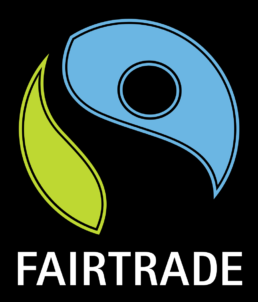The Fairtrade Concept
The FAIRTRADE Mark is an independent consumer label, which appears on products as a guarantee that disadvantaged producers are getting a better deal.
The FAIRTRADE Mark is unique: it guarantees farmers in developing countries a fair price for their products which covers the costs of sustainable production. Because this price is stable it allows them to plan for their future. The rules and practices of international trade are biased in favour of rich countries and powerful companies, often to the cost of poor producers.
As well as providing the framework for socially responsible production and trade, Fairtrade Standards support the social, economic and environmental development of disadvantaged and marginalized small-scale farmers and plantation workers. To meet the standards, farmers’ organisations must have a democratic structure and transparent administration that enables effective control by their members. Plantations and estates must meet internationally recognised employment standards based on core International Labour Organization (ILO) conventions. These include paying workers decent wages, guaranteeing the right to join a trade union, freedom from discrimination, health and safety standards, and the provision of adequate housing and other social provisions where relevant.
Fairtrade also encourages producers and traders to develop mutually beneficial long-term trading relationships. Producers can request pre-finance to pay for fertilisers and other farm inputs to improve their crop without having to take out high-interest loans.

Fairtrade Vending have a range of coffee and vending ingredients all bearing the FAIRTRADE seal of approval

Producer organisations receive a guaranteed minimum price that covers the costs of sustainable production plus an additional premium to invest in health, education, infrastructure, and other community development projects. On plantations, elected workers manage the premium fund with support from management. They receive training in finance and administration to build their capacity to deal with these responsibilities and are further empowered through the acquisition of skills in leadership and communication, and project planning and management.
Fairtrade environmental development criteria ensure that producer organisations make environmental protection an integral part of farm management. This includes minimising the use of chemical fertilisers and insecticides and their gradual replacement with natural alternatives, protection of water, soil structure and other natural resources, and the responsible disposal of waste.
Buying Fairtrade certified products changes the lives of millions of people worldwide and shows how trade can be made to work in favour of poorer people and the environment. When you buy a product carrying the FAIRTRADE Mark, you know it has been certified to meet the international Fairtrade Standards set by Fairtrade Labeling Organisation International (FLO). They check to make sure producers really are getting a better deal.
Fairtrade is not a brand. You can find the FAIRTRADE Mark on products from hundreds of different companies. The FAIRTRADE Mark is an independent stamp of approval.

